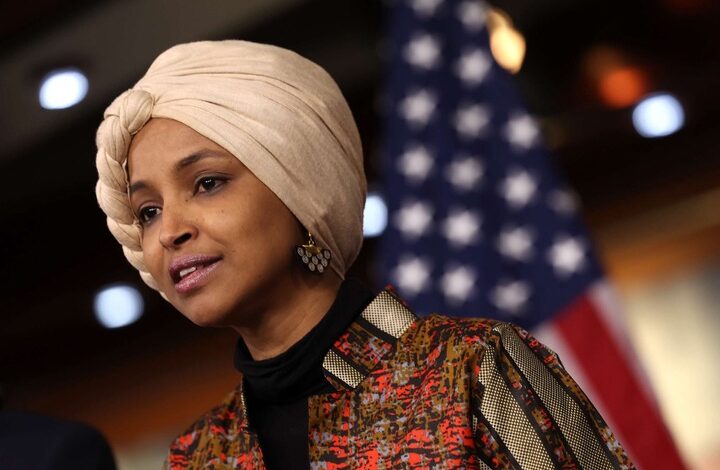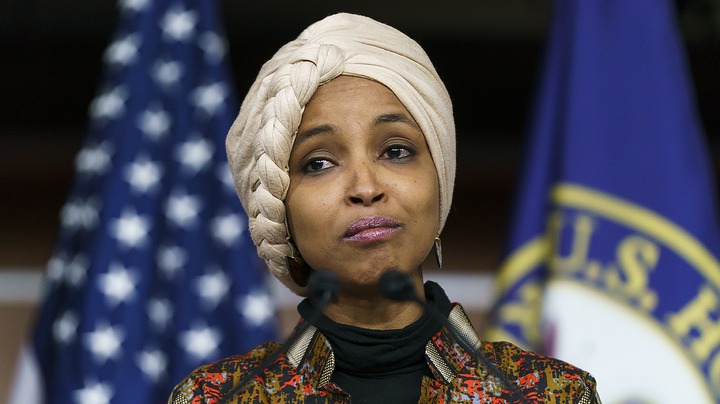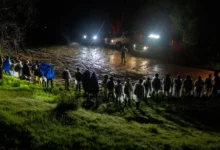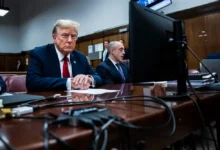Controversial Speech by Ilhan Omar Ignites Outrage, Prompting Calls for Her Removal from Congress by Americans

Congresswoman Ilhan Omar (D-MN) finds herself engulfed in a storm of controversy, sparking widespread outrage and fervent calls for her expulsion from Congress. ( 📈 Maine’s Highest Court Issues Consensus Verdict in Donald Trump Matter ) The focal point of this uproar, as reported by Raw Story on Sunday, January 28, 2024, revolves around Omar’s startling remarks concerning her identity, allegiance, and influence on U.S. policy towards Somalia.

During her speech, Omar boldly asserted her priority, stating that she and her fellow Somalis identify as “Somali first and Muslim second,” conspicuously omitting any reference to their American identity. This declaration ignited a fierce debate, with critics accusing Omar of placing the interests of Somalia above those of the United States, the very nation she represents in Congress.
One of the most contentious aspects of Omar’s address was her claim that she represents Somalia in Congress, suggesting that the Somali community wields control over the U.S. government’s Somalia policy. This assertion raised eyebrows and prompted skepticism, as Americans questioned the appropriateness of a sitting congresswoman seemingly advocating for the interests of another nation over her own.
The location and date of the speech, identified as Minneapolis on January 27, 2024, were pieced together through a partial banner seen in the video. In the aftermath, social media erupted with reactions from Americans expressing dismay and demanding swift action against Omar.
The controversy deepened when a YouTube transcript revealed Omar’s assertion that the U.S. government would do what Somalis tell it to do. This particular statement heightened concerns about the extent of Omar’s influence on U.S. foreign policy, particularly concerning Somalia.
Omar responded to the criticism on Sunday, dismissing the allegations as “slanted” and “completely off.” She stood in solidarity with Somalis, both in Somalia and the diaspora, emphasizing the importance of unity in negotiating land lease agreements with other countries. However, her response failed to quell the growing uproar among Americans who perceived her loyalty and priorities as misplaced.
In the video, Omar also touched upon Somali ethno-nationalism, expressing a desire to reclaim land from neighboring countries. This revelation added fuel to the controversy, with many Americans questioning the appropriateness of such sentiments coming from a U.S. congresswoman. (news-us.feednews.com)
Somaliland, a self-declared independent region mentioned in Omar’s speech, responded strongly to her comments. The Somaliland Foreign Ministry expressed profound surprise and disappointment, condemning Omar’s use of ethno-racist rhetoric and her apparent lack of understanding of basic facts. Somaliland officials emphasized her ignorance of U.S.-Somaliland cooperation and hoped that the House leadership would take note of her conduct.
The reaction from Somaliland highlighted potential diplomatic repercussions, as officials perceived Omar’s statements as detrimental to the relationship between the United States and Somaliland. ( 📈 Why Trump Might Lose to Biden Again Should He Fail To Pick This Leader As His Running Mate ) Critics argue that Omar’s comments raise serious questions about her loyalty to the United States and her suitability to serve in Congress.
This controversy has transcended party lines, with Americans from various political affiliations expressing concern over Omar’s remarks. Some have equated her statements to acts of treason, demanding decisive action, including a vote for her expulsion from Congress. As the debate surrounding Ilhan Omar’s controversial speech continues to unfold, the calls for accountability and potential expulsion from Congress are gaining momentum. Americans grapple with questions about the loyalty and allegiances of their elected representatives, highlighting broader issues of identity and national interest in an increasingly interconnected world.

